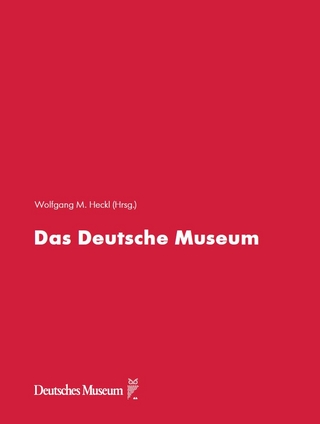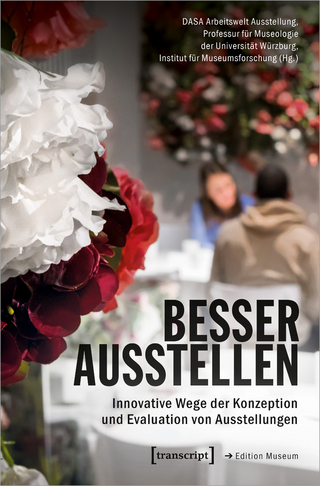
Grasping the World
Routledge (Verlag)
978-0-367-02434-5 (ISBN)
Donald Preziosi is Professor of Art History, UCLA, where he developed and directs the art history critical theory programme, as well as the UCLA museum studies programme.
Part I. Creating Historical Effects. 1. The Fictions of Factual Representation. Hayden White. 2. Psychoanalysis and its History. Michel de Certeau. 3. Rome, the Archetypal Museum, and the Louvre, the Negation of Division. Jean-Louis Déotte. 4. Poetics of the Museum: Lenoir and Du Sommerard. Stephen Bann. 5. Telling Objects: A Narrative Perspective on Collecting. Mieke Bal. Part II. Instituting Evidence. 1. Collective Memory and Memoria Rerum: An Architecture for Thinking. Mary Carruthers. 2. Science-Honour-Metaphor: Italian Cabinets of the Sixteenth and Seventeenth Centuries. Giuseppe Olmi. 3. Natural History and the Emblematic World View. William B. Ashworth Jr. 4. The Museum: Its Classical Etymology and Renaissance Genealogy. Paula Findlen. 5. Inventing Assyria: Exoticism and Reception in Nineteenth-Century England and France. Frederick N. Bohrer. Part III. Building Shared Imaginaries / Effacing Otherness. 1. Double Visions. Homi K. Bhabha. 2. Teddy Bear Patriarchy: Taxidermy in the Garden of Eden, New York City, 1908-1936. Donna Haraway. 3. From the Princely Gallery to the Public Art Museum: The Louvre Museum and the National Gallery, London. Carol Duncan. 4. Museums and the Formation of National and Cultural Identities. Annie E. Coombes. 5. Creating Identity: Exhibiting the Philippines at the 1904 Louisiana Purchase Exposition. Beverly K. Grindstaff. 6. Performing Identity: the Museal Framing of Nazi Ideology. Sandra Esslinger. 7. The Cosmic Theme Park of the Javanese. Shelly Errington. Part IV. Observing Subjects / Disciplining Practice. 1. Introduction to Museum without Walls. André Malraux. 2. Texts/Contexts: Of Other Spaces. Michel Foucaul. 3. Power/Knowledge – Constructed Space and the Subject. Paul Q. Hirst. 4. Museums: Managers of Consciousness. Hans Haacke. 5. The Exhibitionary Complex. Tony Bennett. 6. Orientalism and the Exhibitionary Order. Timothy Mitchell. 7. China in Britain: The Imperial Collections. Craig Clunas. Part V. Secularizing Rituals. 1. The Museum of Modern Art as Late Capitalist Ritual: An Iconographic Analysis. Carol Duncan and Alan Wallach. 2. Animals as Cultural Signs: Collecting Animals in Sixteenth-Century Medici Florence. Claudia Lazzaro. 3. Remarks on the Collection of Rudolf II: the Kunstkammer as a Form of Representatio. Thomas DaCosta Kaufmann. 4. Philipp Hainhofer and Gustavus Adolphus’s Kunstschrank. Hans-Olof Boström. 5. Museums in Eighteenth-Century Rome. Francis Haskell and Nicholas Penny. 6. The Genesis and Early Development of the Royal Museum in Stockholm: A Claim for Authenticity and Legitimacy. Magnus Olausson and Solfrid Söderlind. 7. The Cultural Logic of the Late Capitalist Museum. Rosalind Krauss. 8. Collision. Neil Cummings and Marysia Lewandowska. Part VI. Inclusions and Exclusions: Representing Adequately. 1. Cultural Reflections. Moira Simpson. 2. Histories of the Tribal and the Modern. James Clifford. 3. Always True to the Object, in Our Fashion. Susan Vogel. 4. From Primitivism to Ethnic Arts. Rasheed Araeen. 5. Museums are Good to Think: Heritage on View in India. Arjun Appadurai and Carol A. Breckenridge. 6. Remaking Passports: Visual Thought in the Debate on Multiculturalism. Néstor García Canclini. 7. Our (Museum) World Turned Upside Down: Re-presenting Native American Arts. Janet Catherine Berlo and Ruth B. Phillips. 8. The Museum of Contemporary Art, Los Angeles: An Account of Collaboration between Artists, Trustees and an Architect. Jo-Anne Berelowitz. 9. The Identity Car Project and the Tower of Faces at the United States Holocaust Memorial Museum. Andrew Liss. 10. Where is ‘Africa’? Re-Viewing Art and Artifact in the Age of Globalization. Ruth B. Phillips.
| Erscheinungsdatum | 01.09.2020 |
|---|---|
| Reihe/Serie | Routledge Revivals |
| Verlagsort | London |
| Sprache | englisch |
| Maße | 156 x 234 mm |
| Gewicht | 1400 g |
| Themenwelt | Kunst / Musik / Theater |
| Reisen ► Reiseführer | |
| Geisteswissenschaften ► Geschichte ► Hilfswissenschaften | |
| Sozialwissenschaften ► Soziologie | |
| ISBN-10 | 0-367-02434-9 / 0367024349 |
| ISBN-13 | 978-0-367-02434-5 / 9780367024345 |
| Zustand | Neuware |
| Informationen gemäß Produktsicherheitsverordnung (GPSR) | |
| Haben Sie eine Frage zum Produkt? |
aus dem Bereich


